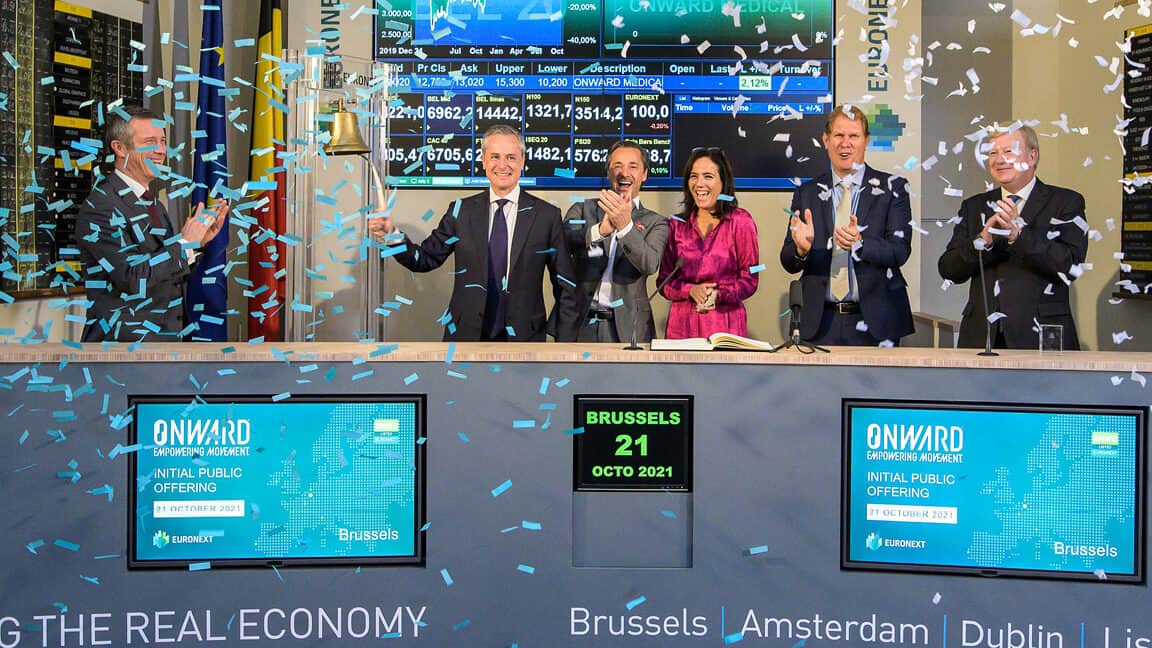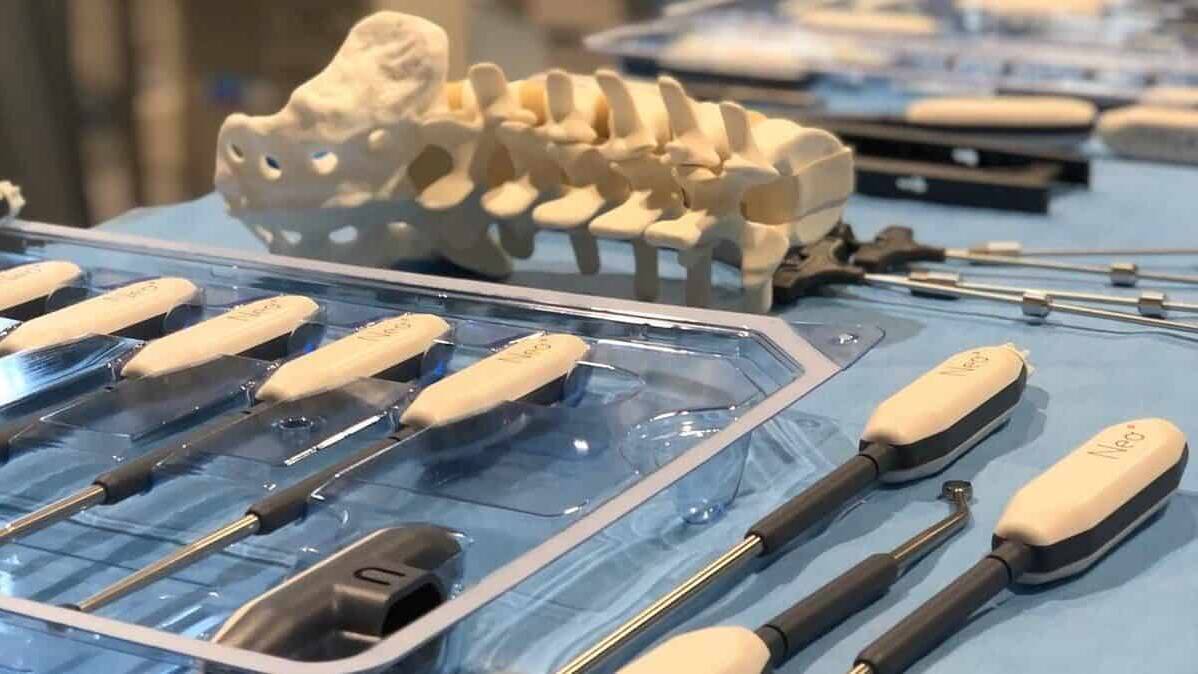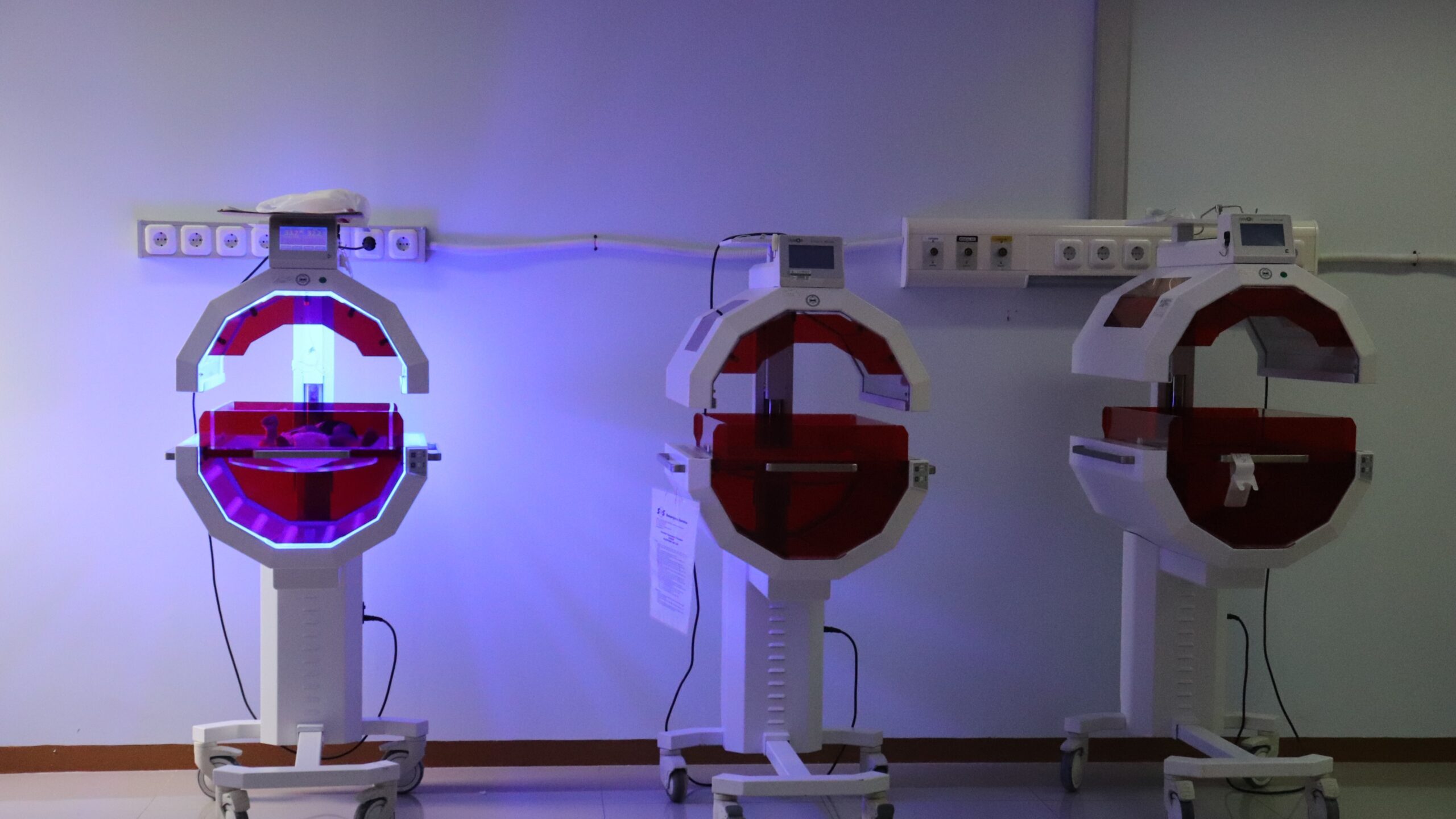Cutting-edge medical technology relies on production partners with very specific skills. A visit to Ruetschi Technology, where Neo Medical’s products for spine surgery are manufactured, is a tale of how a Swiss family firm found a new future for its precision manufacturing skills.
Muntelier is a small town (population of 972) on the shores of the picturesque Lake Morat behind which the Jura mountains rise. This part of Switzerland is renowned for its rich watchmaking tradition. In this small town, the Montilier Watch Co. S.A. (est. 1852) already closed its gates in 1962. But a short walk uphill from the main road a building that gleams in the early December sun. This is the main production site of Ruetschi Technology. The family-owned company employs 200 people and is rooted in the manufacturing tradition that makes Swiss watches world-famous.
Chairman and Co-CEO Christoph Ruetschi has a firm handshake and walks with light steps. He transformed the firm he inherited to a specialized producer of medical equipment. He’s fascinated by the magic his clients perform, how they improve patient’s lives with their skill and humble products such as screws used in orthopedics to fix spines. “I would have liked to become a surgeon” he says. But like his father, Christoph became a mechanical engineer.
The company’s history starts in 1959, Christoph’s father Charles Ruetschi worked as a mechanical engineer for the industrial giant Brown, Boveri & Cie (now ABB). A client had asked Brown Boveri if they could provide them with welding machines for watch dials. But machines for such small parts weren’t Brown Boveri’s forte, and the company declined the request. Charles decided to seize the opportunity. He took the idea and the client and established his own company. The beginnings were humble. Charles’ workshop was so small that the machines had to be taken apart after assembly to get them out of the door and ship them to the clients. But it soon turned into a successful enterprise. Even today, about half of the dials of high-end Swiss watches are still welded with Ruetschi machines, one of which is on display at the reception of the company. But over time Ruetschi Technology evolved into a dedicated manufacturer of medical devices, more precisely, so-called procedure kits. These are disposable medical devices that combine an implant with all surgical instruments in one sterile package.
Soon after Charles’ son Christoph graduated, challenges were foisted upon him that were tougher than mere engineering tasks. When his father became ill, he had to take the reins of the company at the early age of 29. Over the next two decades, he and his team transformed it and more than tripled its number of employees. The two major strategic shifts were the specialization in medtech and the transformation from a simple contract manufacturer to a firm with an in-house product development team.
Christoph is convinced that the establishment of an own development team was the most important step he took. As a sole contract manufacturer, you compete with others only in terms of price, a game Swiss companies struggle to win even with advanced automation. But with an engineering department that is very close to the production lines, Ruetschi can offer specific know-how that has a value on its own. Furthermore, the production of orthopedic material has to follow strict rules. This is why more than two dozen people work in quality assurance and regulatory matters, making sure that Ruetschi’s products are compliant with the increasingly tough regulatory framework. The EU’s medical device regulation, by which all products are measured after the 26th of May 2020, keeps them busy.
The production of orthopedic material has to follow strict rules.
Focusing on in-house development helped Ruetschi survive the increasing pressure on export-oriented manufacturers in Switzerland. The EUR/CHF exchange rate fell from 1.65 in 2007 to below 1.20 in 2015, which made it harder and harder to compete on price. “This has already led to brutal consolidation among manufacturers in Switzerland active in related areas”, says Christoph. Smaller companies that can’t build their own development expertise have a bleak future, he surmises.
The factory in Muntelier is one of the three production sites of Ruetschi Technology. It transforms, simply put, metal into parts that will be implanted into human bodies. The factory floor is color-coded. We start our tour in the grey area that is home to large automated milling machines and barrels of liquid to keep them greased. This modern machinery can cost up to several hundred thousand francs apiece. What is gained must be reinvested without pause, the owner says. One of the machines transforms long metal rods into delicate screws with a hollow shaft. The machine operator hands over a specimen and says that it took 8 minutes and 23 seconds to mill. It is fascinating and scary at the same time to think that soon a surgeon will screw this implant unceremoniously into someone’s bone to fix two vertebrae of the spine together. Surgeons, it seems, are akin to mechanics in white coats.
The screw in Christoph’s hand is a product Ruetschi Technology manufactures for Neo Medical, a Swiss medtech startup. It will eventually wind up in one of Neo Medical’s procedure kits. These kits are a success with the surgeons who use them and have already been used in more than 5000 spine surgeries worldwide. The collaboration between the two firms started in 2013 when the startup was looking for a production partner for its products. “Neo Medical came to us with a brilliant and fundamentally new concept that was driven by input from the market, the surgeons” remembers Christoph. An intense collaboration with Ruetschi’s development team started. It took less than 3 years from prototype to the final certified product, with numerous iterations and improvements on the way. “When you know what kind of validations a sterilized product must go through, this was extremely fast”, says Christoph.
The screw that just came out of the milling machine, as well as anything else from this part of the factory, will need to be thoroughly cleaned. The parts are degreased and taken to rooms that have blue floors, which indicate that this is the clean part of the building. Then they are bathed in ultrasonic cleaners that make sure even the narrowest interstices are reached. Final packaging takes place in a cleanroom where a dozen white-clad operators silently shuffle around. Ruetschi sells single-use sterile procedure kits. This means that surgeons and dentists take the parts they need directly from the package and use them on the patient. This is a completely different approach from the traditional multi-use equipment that needs to be sterilized according to specific instructions before every procedure. “Every year more than 2.6 Million patients get infected in hospitals in Europe”, Christoph explains. He sees procedure kits as one way to reduce that number.
Christoph, who is passionate about technology, was fascinated by the product idea from the day he first heard of it. This eventually led to much more than just a relationship with a new client. At that time Ruetschi Technology was very actively exploring new projects. “We looked at about 10 different things. In the end, we decided to invest into Neo Medical”, says Christoph. Taking an equity stake in a client allows one to enter contracts one wouldn’t do otherwise, and think differently in terms of optimizing the relationship, Christoph explains. It was a calculated risk, as the family firm didn’t have the firepower to invest in dozens of startups with the hope that one might eventually succeed. It paid well. Neo Medical is growing rapidly, increasing its revenues substantially and has become not just a good investment, but also an important client for Ruetschi Technology. “Finding and winning new clients is very difficult, so it makes sense to nurture them”, says Christoph with a grin.
Neo Medical’s procedure kits include not only metal parts such as screws, but tools and instruments used in operations as well, and they have plastic parts in addition to metal parts. To secure this complementary manufacturing know-how, Ruetschi Technology took over a family firm specialized in injection molding in 2006, André Gueissaz SA. For the two brothers Gueissaz who ran the firm founded in 1848, the sale was a welcome solution to the succession problem the firm had. This also shows how many very specific elements have to be in place to build a future for firms steeped in tradition, especially when external factors such as exchange rates threaten their very existence.
“I’ll never forget the 15th of January 2015. I thought: now we’re dead.” On that date, the relative strengthening of the Swiss Franc vis-à-vis the Euro that was underway for a long time increased dramatically as the Swiss National Bank removed its exchange rate floor. As a reaction to this sudden competitive disadvantage versus manufacturers in the Eurozone, Ruetschi Technology opened its third production site, in Renquishausen, Germany. Many Swiss manufacturers did the same to shift a part of their cost base into Eurozone and bring it into balance with their revenues in Euros, a move called natural hedging. Apart from financial reasons, it was also a way to tap the highly skilled German labor force, explains Christoph.
Today, Ruetschi Technology is far from dead, it is thriving. The company invests in lean manufacturing methods, a prerequisite to automate even further, and in advanced machinery that is on display in a separate room. Two large 3D printers turn powdered titanium into small but very solid metallic sponges. These cages, as they’re called, are another product for Neo Medical. They’re implanted like placeholders between the vertebrae of the spine before these are fused together. The porousness of the cages that can be achieved with 3D printing is not a gimmick, it encourages the bones to connect to the material, a process called osseointegration.
The second-generation family firm Ruetschi Technology and the startup Neo Medical have grown close. The firms have financial ties, and depend to a certain extent on their mutual success. And more than that. “Over time, friendships have been forged”, says Christoph.
Written by
WITH US, YOU CANCO-INVEST IN DEEP TECH STARTUPS

Verve's investor network
With annual investments of EUR 60-70 mio, we belong to the top 10% most active startup investors in Europe. We therefore get you into competitive financing rounds alongside other world-class venture capital funds.
We empower you to build your individual portfolio.
More News
02.12.2021
“ONWARD did the largest European medical device IPO this year”
EPFL spin-off ONWARD aims to improve the quality of live of people bound to a wheelchair by spinal cord injury. After the successful IPO in October, CEO Dave Marver looks forward to 2022, when the company is facing important milestones.
25.11.2021
“Our technology reduces the time in surgery by 29%“
The largest segment of spine surgery, thoracolumbar fixation, hasn’t seen a lot of true disruptive innovation. With startup Neo Medical, Vincent Lefauconnier is changing how spine surgeries are done. In this interview, he explains why less is more in the operating room.
17.09.2021
“I experienced the challenges of bringing a MedTech product to market first-hand”
In this interview, MedTech expert Karina Candrian explains why startups should think about market access and regulatory topics early on.
Startups,Innovation andVenture Capital
Sign up to receive our weekly newsletter and learn about investing in technologies that are changing the world.




